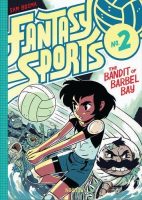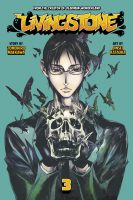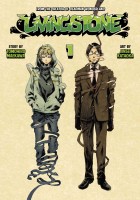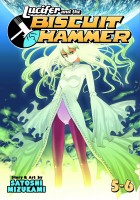My News and Reviews
A new review was posted last week at Experiments in Manga! I’ve been meaning to get around to it since the book was first released back in February, but I’ve finally written up my thoughts on Know What You Want, written by Lianne Sentar. It’s a collection of short, sexually-charged side stories related to Tokyo Demons which is a series that I absolutely love. Reading Know What You Want isn’t necessary to understand the main series, but it does provide more character development, worldbuilding, and background information. Also, like Tokyo Demons proper, the stories can often be heartwrenching.
As for other interesting things found online: Two Tsutomu Nihei interviews were recently posted, one from Brigid Alverson for Barnes & Noble and one from Deb Aoki for Anime News Network. Taiyo Nakashima has a write up of a dialogue between Tetsuo Hara and Kentaro Miura for the Silent Manga Audition website. Publishers Weekly’s podcast More to Come recently featured Frederik L. Schodt discussing Osamu Tezuka. The second episode of the Translator Tea Time podcast is now available. Also at The OASG, eleven translators of anime and manga answer how they learned Japanese.
Quick Takes
 Fantasy Sports, Volume 2: The Bandit of Barbel Bay by Sam Bosma. I adored the first volume of Fantasy Sports. While I was looking forward to the next volume, I was also a little afraid that it wouldn’t live up to expectations. Happily, The Bandit of Barbel Bay is just as good as the first Fantasy Sports. I actually may have somehow enjoyed it even more. After defeating an ancient mummy in an epic game of basketball in order to secure an impressive amount of treasure, Wiz and Mug are trying to return to the pyramid of the Order of Mages when they end up robbed and stranded in Barbel Bay. This time they will have to win an ultimate volleyball tournament if they want to escape with the treasure and their lives. All goes well until they must face the champions of Barbel Bay, a pair of twins with godlike powers who rule the court. The story definitely has its fair share of silliness, but there’s also something sinister about the Order of Mages that is slowly being revealed. The Bandit of Barbel Bay is fantastic. Bosma’s artwork and colors are great; the characters are wonderful (the twins in particular are highly entertaining); the comic’s sense of humor is marvelous. Fantasy Sports is an absolute delight and incredibly charming; I can’t wait for the next volume to be released!
Fantasy Sports, Volume 2: The Bandit of Barbel Bay by Sam Bosma. I adored the first volume of Fantasy Sports. While I was looking forward to the next volume, I was also a little afraid that it wouldn’t live up to expectations. Happily, The Bandit of Barbel Bay is just as good as the first Fantasy Sports. I actually may have somehow enjoyed it even more. After defeating an ancient mummy in an epic game of basketball in order to secure an impressive amount of treasure, Wiz and Mug are trying to return to the pyramid of the Order of Mages when they end up robbed and stranded in Barbel Bay. This time they will have to win an ultimate volleyball tournament if they want to escape with the treasure and their lives. All goes well until they must face the champions of Barbel Bay, a pair of twins with godlike powers who rule the court. The story definitely has its fair share of silliness, but there’s also something sinister about the Order of Mages that is slowly being revealed. The Bandit of Barbel Bay is fantastic. Bosma’s artwork and colors are great; the characters are wonderful (the twins in particular are highly entertaining); the comic’s sense of humor is marvelous. Fantasy Sports is an absolute delight and incredibly charming; I can’t wait for the next volume to be released!
 Livingstone, Volume 3 written by Tomohiro Maekawa and illustrated by Jinsei Kataoka. For the most part, Livingstone continues to be a largely episodic manga. However, there is also an underlying story about Amano and the truth behind his existence that seems to be taking some precedence. Livingstone is apparently only four volumes (for some reason I thought it was longer than that), so I suspect that the fourth volume will largely be devoted to Amano. I was actually a little surprised by some of the recent developments in Livingstone and their implications–either I completely misunderstood some of the worldbuilding in the series or the creators have completely changed what they originally established. Either way, while the ambiguity is a little frustrating, overall I do find the series interesting. The individual stories, all of which deal with death in some way, range from uplifting to depressing although the series does have comedic undertones. Kataoka’s artwork fits the tone of the series well, creating a vaguely unsettling and disconcerting atmosphere while still managing to convey the humor. (One of primary reasons I was interested in Livingstone to begin with was actually because of Kataoka’s involvement.) Livingstone is a kind of a strange and uneven manga, but I’m still curious enough to want to see how it concludes.
Livingstone, Volume 3 written by Tomohiro Maekawa and illustrated by Jinsei Kataoka. For the most part, Livingstone continues to be a largely episodic manga. However, there is also an underlying story about Amano and the truth behind his existence that seems to be taking some precedence. Livingstone is apparently only four volumes (for some reason I thought it was longer than that), so I suspect that the fourth volume will largely be devoted to Amano. I was actually a little surprised by some of the recent developments in Livingstone and their implications–either I completely misunderstood some of the worldbuilding in the series or the creators have completely changed what they originally established. Either way, while the ambiguity is a little frustrating, overall I do find the series interesting. The individual stories, all of which deal with death in some way, range from uplifting to depressing although the series does have comedic undertones. Kataoka’s artwork fits the tone of the series well, creating a vaguely unsettling and disconcerting atmosphere while still managing to convey the humor. (One of primary reasons I was interested in Livingstone to begin with was actually because of Kataoka’s involvement.) Livingstone is a kind of a strange and uneven manga, but I’m still curious enough to want to see how it concludes.
 Real Account, Volume 3 written by Okushou and illustrated by Shizumu Watanabe. The end of the second volume of Real Account included a major revelation about Ataru and ended with a pretty major twist on top of that. Not everything thing has been explained yet about that particular development, but the third volume abandons Ataru entirely to follow a new lead, Yuma. The creators do mention that Ataru isn’t completely gone from the series, but he doesn’t make even a token appearance in the third volume. Yuma is understandably similar to Ataru in many key ways, but the sudden shift in protagonists doesn’t work especially well. Despite knowing a fair amount of Yuma’s backstory before the volume begins, readers aren’t given much opportunity to really empathize with him before he’s thrown into the same life-or-death game as Ataru. And while I understand why the series is emphasizing how alike Yuma and Ataru are, the first chapter of the third volume feels extremely repetitive. For those reasons, I didn’t enjoy this particular installment of the series as much as the two that came before, but the series is still intriguing and the social media-inspired games are clever (though I did feel a bit cheated by some of their solutions). And I did appreciate that the third volume showed more of what is happening outside of Real Account, too.
Real Account, Volume 3 written by Okushou and illustrated by Shizumu Watanabe. The end of the second volume of Real Account included a major revelation about Ataru and ended with a pretty major twist on top of that. Not everything thing has been explained yet about that particular development, but the third volume abandons Ataru entirely to follow a new lead, Yuma. The creators do mention that Ataru isn’t completely gone from the series, but he doesn’t make even a token appearance in the third volume. Yuma is understandably similar to Ataru in many key ways, but the sudden shift in protagonists doesn’t work especially well. Despite knowing a fair amount of Yuma’s backstory before the volume begins, readers aren’t given much opportunity to really empathize with him before he’s thrown into the same life-or-death game as Ataru. And while I understand why the series is emphasizing how alike Yuma and Ataru are, the first chapter of the third volume feels extremely repetitive. For those reasons, I didn’t enjoy this particular installment of the series as much as the two that came before, but the series is still intriguing and the social media-inspired games are clever (though I did feel a bit cheated by some of their solutions). And I did appreciate that the third volume showed more of what is happening outside of Real Account, too.



